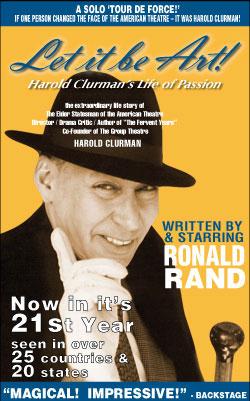Jennifer Horne
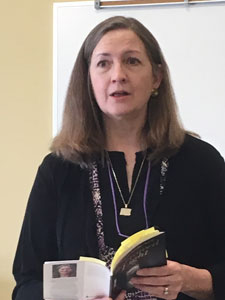 is the commissioned Poet Laureate of Alabama from 2017-2021. In 2018, she was the visiting writer-in-residence at Lenoir-Rhyne College in Hickory, North Carolina. Ms. Horne is a teacher, a writer and the author of two books of poems, Bottle Tree and Little Wanderer, and three poetry chapbooks, Borrowed Light, Miss Betty’s School of Dance, and Tineretului. She is also the author of Tell the World You’re a Wildflower, a collection of short stories in the voices of Southern women and girls. She is the editor of Working the Dirt: An Anthology of Southern Poets, and co-editor, with Wendy Reed, of All out of Faith: Southern Women on Spirituality and Circling Faith: Southern Women on Spirituality. She has also co-edited, with Don Noble, Belles’ Letters II, a collection of short fiction. Her poems have appeared in Amaryllis, the Birmingham Poetry Review, Carolina Quarterly, the Dry Creek Review, and Sycamore Review, among others. She has been the recipient of fellowships from the Alabama State Council on the Arts and the Seaside Institute in Florida and has worked as a teacher in college, high school, elementary school, and prison classrooms. She received the 2015 Druid City Literary Arts Award, given by the Tuscaloosa Arts Council. She is currently at work on a biography of Alabama writer Sara Mayfield. For more on her work, visit: “A Map of the World,” jennifer-horne.blogspot.com
is the commissioned Poet Laureate of Alabama from 2017-2021. In 2018, she was the visiting writer-in-residence at Lenoir-Rhyne College in Hickory, North Carolina. Ms. Horne is a teacher, a writer and the author of two books of poems, Bottle Tree and Little Wanderer, and three poetry chapbooks, Borrowed Light, Miss Betty’s School of Dance, and Tineretului. She is also the author of Tell the World You’re a Wildflower, a collection of short stories in the voices of Southern women and girls. She is the editor of Working the Dirt: An Anthology of Southern Poets, and co-editor, with Wendy Reed, of All out of Faith: Southern Women on Spirituality and Circling Faith: Southern Women on Spirituality. She has also co-edited, with Don Noble, Belles’ Letters II, a collection of short fiction. Her poems have appeared in Amaryllis, the Birmingham Poetry Review, Carolina Quarterly, the Dry Creek Review, and Sycamore Review, among others. She has been the recipient of fellowships from the Alabama State Council on the Arts and the Seaside Institute in Florida and has worked as a teacher in college, high school, elementary school, and prison classrooms. She received the 2015 Druid City Literary Arts Award, given by the Tuscaloosa Arts Council. She is currently at work on a biography of Alabama writer Sara Mayfield. For more on her work, visit: “A Map of the World,” jennifer-horne.blogspot.com
What does the power of poetry mean to you?
I believe poetry is an important form of human communication, a way of relating to one another through our experiences. No matter how disparate we are, poetry connects us to someone in other cultures, or someone from hundreds of years ago. I can connect to different ages, to other people in other lands and distances, time collapses.
Did you begin poetry at an early age?
It goes back to my childhood. My mother was quite a good poet. She had written her whole life. She encouraged both my sister and me to write, and my sister became a singer/songwriter, and I took to poetry, to the pleasure in words, of putting them together. I felt I could create something as a young writer; that got me hooked in the first place.

Jennifer Horne with Alabama Governor Kay Ivey
Do you feel having one’s work published is important to a poet’s growth?
Making poetry public by it being published is rewarding. But there are many ways to publish: a poet can self-publish their work or hand poems out at conferences. A lot of poetry today is published in online journals and magazines. Being published can also help someone feel their poetry is worthy enough to be published. It can get you started and give you a boost in your career.
Some time ago, I made a personal decision to publish in journals mostly in the region I was living. Not because I think of myself solely as a Southern poet but so I can build a readership and have more of a human connection and be part of a larger poetic community and conversation.
There’s a very nice literary network in Alabama connecting poets to other poets which essentially allows us to share our love for poetry with one another.
It took me literally until I was fifty to have a book published. I thought it would happen much sooner. I was personally frustrated. But it comes when it’s meant to happen. You can try and make it happen sooner, but you have to have faith in your work and that it will happen eventually.
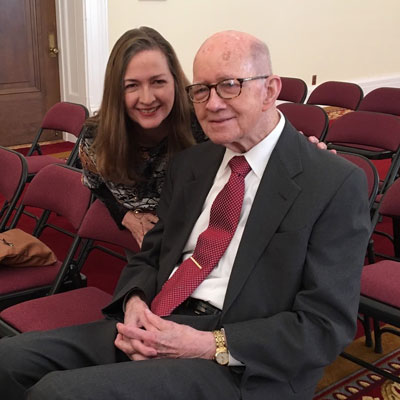
Jennifer Horne with her father
How does a poem arrive for you?
I often think something has probably been percolating under the surface in my consciousness, and it sort of arrives. And then there it is. I like the description of a sculptor working. You chip away until you get to what is left. And there is the poem. I may have a sense of it, I may have a shape, and I have to keep working towards what I sense it is, and it may arrive from an ‘inside-outside’ combination.
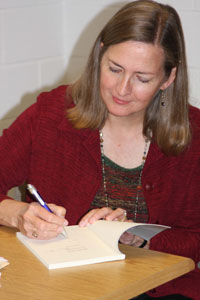 I guess that’s what creativity is. You train yourself as a writer, paying attention. Elizabeth Gilbert has a wonderful book on creativity, Big Magic: Creative Living Beyond Fear, which talks about the big magic that’s always there, which you learn as a creator, and how to stay open and available to it. To not ignore it and to allow yourself to be available to that source of creativity.
I guess that’s what creativity is. You train yourself as a writer, paying attention. Elizabeth Gilbert has a wonderful book on creativity, Big Magic: Creative Living Beyond Fear, which talks about the big magic that’s always there, which you learn as a creator, and how to stay open and available to it. To not ignore it and to allow yourself to be available to that source of creativity.
Did it make a difference studying poetry and literature?
It has made a difference to me. I’ll tell you how – although you don’t have to have a formal education to be a poet. You can just read widely in poetry. But it’s very grounding to have a formal education to be a poet. As an undergrad I studied with Denise Levertov, who was one of the Black Mountain poets. When I read her poetry, and in her class, she taught us how to focus on the image and take it in.
I received my M.F.A. at the University of Alabama, and I learned a grounding in the tradition of poetry which is good for all poets. To know what poets before you have done. It gave me a sense in relation to their individual perspective, to tune into my own writing. It helped me to distinguish my way of seeing.
More recently, I studied Irish poets including Yeats and how he wrote as a young writer, first using folklore and then moving into more of a political and public position. That helped me see how to write in my own voice about larger issues. Not to necessarily write propaganda but how to be true to yourself and your own perceptions and concerns.
Why is reading poetry important for our daily life?
I really do read a poem every day; it’s a daily habit and a wonderful practice for a poet. I like to read before going to sleep; I always read a poem first and then other books. Right now, I’m mostly reading Alabama poets. Everyone should take at least thirty seconds a day and read a poem. A poem can shift you physically and emotionally with what’s going on in your day.
Your Three Poems in Story South is a deep-felt collection, that takes you many places in your heart and psyche. What led you to need to write those and were you surprised where they took you?
Those poems began with an image and I wrote them immediately as they came to me, then came back to them to see where the image took me. One of my goals was to write a long poem about the South (“WPA”). It was an intentional poem; I built and gathered it and brought things in over the period of my time in Alabama. All the weight of history, the beauty of nature, it became a collage, and I pulled in actual experience of the South based on my own experiences that I went through, and experiences the South went through, and what they meant to me.
How do you know when your poem is complete?
I have a sense of it telling me that it’s finished; it’s an intuitive sense. I will worry over a poem until all the parts feel right, but it’s never perfect. The ideal poem you may have had in your head – you try and get it as close to it as you can.
When it’s not working for me, I realize I was kidding myself that it was finished, and then just get back to revising it. It’s also helpful to have somebody else look at it when it’s not quite clear. It’s possible you can become blind to it, so it’s a matter of trust as to who you show your work to.
 To me, a connection needs to occur in the words so when you read something, you know that you captured it. Somehow it tells the truth about the experience. Not every poem will speak truth to every person. We’re always trying to get some sense of what the truth of an experience is. We’re always trying to make meaning out of life as human beings.
To me, a connection needs to occur in the words so when you read something, you know that you captured it. Somehow it tells the truth about the experience. Not every poem will speak truth to every person. We’re always trying to get some sense of what the truth of an experience is. We’re always trying to make meaning out of life as human beings.
There are a few people I trust implicitly as a writer to look at my work, so I’m not operating in a vacuum. You never want to fall into a rut or do what you did before. You always push yourself to tell the truth.
Has it gotten easier writing poetry? Do you have to be inspired to write poetry?
Every poem is a new challenge, but it’s much easier to claim being a poet at this stage in my life. When I didn’t have a book published, I worried I wasn’t a “real poet.” Now I’ve been writing poetry for fifty years; it’s what I do with my life. It’s comforting and comfortable, and I find myself through it. I feel myself most alive. I think it’s my most natural expression, the way I communicate with myself and with others as long as I’m alive.
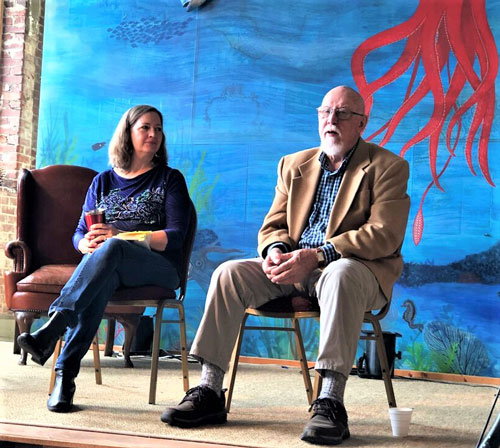
Jennifer Horne with Don Noble
It must give you a lot of joy talking about poetry?
I really like doing it. People usually think of poetry as something mysterious and difficult. So, when I have the chance to speak about poetry, I can talk about poetry as part of our daily life. That everyone can write a poem, since it’s a form of human expression, and that’s the best part.
People have wonderful things they tell me about the role of poetry in their lives. For instance, it was wonderful to see the president of the Rotary Club in Montgomery begin the meeting each week with a poem; he really loves poetry. That’s a beautiful thing when you see a connection like that to poetry.
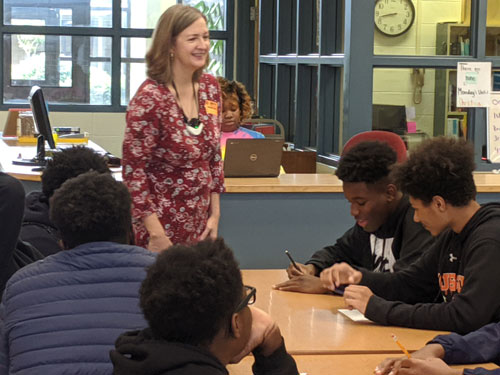
Jennifer Horne with students

























